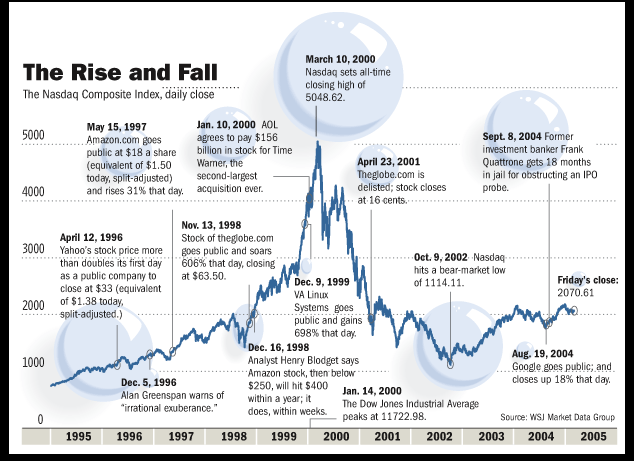
What happened with the Dotcom bubble?
The Dotcom bubble was a time in the late 1990s and early 2000s where people were really excited about the internet and all the new websites popping up. People started investing a lot of money into these new companies just because they had "dotcom" in their name and thought they would make a lot of money.
The bubble began to inflate in the late 1990s, as more and more people gained access to the internet and the World Wide Web became an increasingly important part of everyday life. This led to a surge in the number of tech startups that were looking to take advantage of the new opportunities that the internet presented. Venture capitalists poured money into these companies, betting that they would be the next big thing.
The stock market also reflected this optimism, as the Nasdaq composite index, which is heavily weighted towards tech stocks, soared from under 1,000 in 1995 to over 5,000 in 2000. Many of these companies went public and their stock prices soared, leading to a wave of initial public offerings (IPOs) and mergers and acquisitions (M&As).
However, this excitement was not based on reality. Many of these dotcom companies were not turning a profit, and many had no clear path to ever doing so. They were valued based on the number of visitors to their website, rather than their actual financial performance.
The bubble finally burst in 2000, as investors began to realize that many of these companies were not going to be the next big thing after all. The Nasdaq began to decline and many dotcoms started to go bankrupt.
Which companies survived the Dotcom crash?
After the dotcom crash, many internet companies went out of business or struggled to stay in business. However, a few companies that had a solid business model and were able to survive and even thrive in the aftermath of the bubble.
One of the first companies to become successful after the dotcom crash was Google. The company was founded in 1998, right before the crash, but was able to weather the storm by focusing on its search engine and developing a profitable advertising business model. Google's search algorithm was superior to other search engines of the time and in 2004 Google went public, becoming one of the most valuable companies in the world.
Another early success story after the dotcom crash was online marketplace, Amazon. Amazon had been founded in 1995, before the Dotcom bubble, and had a clear path to profitability by focusing on e-commerce. It had a vision of becoming the worlds largest online retailer, and it continued to expand its product offerings and make strategic acquisitions, like Wholefoods.
Then lastly, there was a company that became successful after the dotcom crash which was PayPal. Founded in 1998, Paypal was able to establish itself as a leading online payment platform. In 2002 it was acquired by eBay and it helped enable a reliable way for its users to pay and get paid in a secure way
It's worth noting that, the Dotcom crash had also led to the emergence of few new companies, that were built on the lessons learned from the bubble, with a solid business model and a sustainable path to revenue, like LinkedIn, and Salesforce. They were able to grow and become successful after the crash because they were able to navigate the new economic environment better.
Conclusion
The Dotcom bubble had a significant impact on the economy, as many people lost their savings and the tech industry was hit hard. It also had a lasting impact on the way that investors and venture capitalists approach investing in tech startups. Nowadays, the emphasis is on profitability and sustainability, rather than just rapid growth.
This also served as a reminder that even the most revolutionary and groundbreaking technologies can be subject to irrational exuberance and that sustainable growth, profitability, and a clear path to revenue should be the key consideration for any business.
So just like 20 years ago, there can be a lot of excitement about new world changing technologies, but if excitement exceeds reality then it can lead to a loss in trust for these new technologies. However, just like the few companies that survived the dotcom crash, we might expect the same thing to happen again.
Also the whole world was changed by the internet after the crash, and now almost everything is done on the internet, and it would not surprise me that if we see the same thing happen with blockchain.
What are your thoughts on this? Let me know in the comments, and thanks for taking the time to read this. Have a great day!
(Disclaimer: I am not a financial or investment adviser, and none of my posts or replies are financial or investment advice.)
Posted Using LeoFinance Beta
The rewards earned on this comment will go directly to the people sharing the post on Twitter as long as they are registered with @poshtoken. Sign up at https://hiveposh.com.